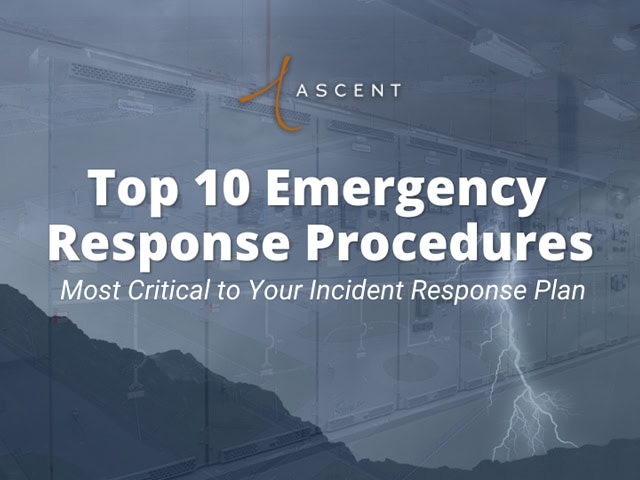Extreme weather conditions and disasters can strike at a moment’s notice, and data center site teams face the brunt of preparing for, and addressing these challenges. The past year of rapidly changing operating conditions, and most recently, extreme weather conditions, have taken a toll on the site teams. Even with advance planning, strategic sourcing and creative resourcefulness, operational recovery plans are not only needed, but critical to support the field teams in the moment to maintain uptime.
So, how can data center site operations teams stay one step ahead of the critical response curve? With an Incident Response Plan. Quickly identifying the appropriate response to the incident and applying the relevant emergency recovery procedures, are all crucial to include within your response plan.
At Ascent, we concentrate on personnel safety and risk mitigation within critical facilities and data centers as part of the normal day to day operation, as well as within the Incident Response Plan. Ascent’s Operations Team assists organizations with building and improving their operational program to comprehensively address all identified risks within the critical environment and plan appropriately for disaster recovery.
Ascent recommends the following 10 Emergency Response Procedures be included in Incident Response Plans:
- Loss of Utility Power
- UPS Failure (Major Fault)
- Loss of HVAC
- Loss of BMS (Building Management System)
- Loss of Generator
- Loss of Switchgear PLC or Automatic Switching Control
- Tripped PDU/RPP Branch Circuit Breaker
- Chilled Water Piping Rupture/Uncontrolled Leak
- Loss of Public Utilities (Water)
- Emergency Power Off (EPO) Recovery
Each ERP is specific to the site the Incident Response Plan is developed for, with the primary objectives to maintain safe operations and mitigate risks to the critical environment.
Not only is the Plan and Emergency Response Procedures within it critical, but the process itself to update an existing Incident Response Plan is key to uncovering electrical, mechanical and controls related plant additions to further reduce risk in the event of an emergency.
With this, site operations teams can make every effort to prevent critical situations and be as prepared as possible in the case of an event. It is in these types of preparedness evolutions that site operations teams collaborate comprehensively to discuss and methodically plan emergency response. Not only do these collaborations promote the team morale, but they also serve as training for real events.
Whether tackling the worst scenarios, such as the Winter Storms of 2021 in Texas, or staying ahead of emergencies and disasters, Incident Response Plans provide the procedures and processes to enact proper reaction to any critical event.
Have questions? Contact Ascent today!
